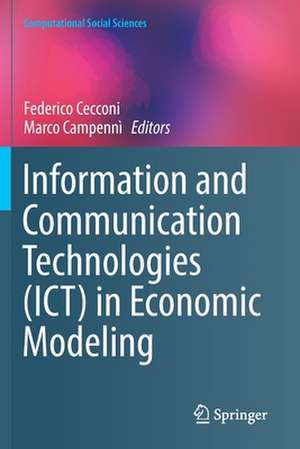Information and Communication Technologies (ICT) in Economic Modeling: Computational Social Sciences
Editat de Federico Cecconi, Marco Campennìen Limba Engleză Paperback – 14 aug 2020
| Toate formatele și edițiile | Preț | Express |
|---|---|---|
| Paperback (1) | 523.07 lei 6-8 săpt. | |
| Springer International Publishing – 14 aug 2020 | 523.07 lei 6-8 săpt. | |
| Hardback (1) | 698.62 lei 6-8 săpt. | |
| Springer International Publishing – 8 aug 2019 | 698.62 lei 6-8 săpt. |
Din seria Computational Social Sciences
- 15%
 Preț: 649.39 lei
Preț: 649.39 lei - 18%
 Preț: 964.54 lei
Preț: 964.54 lei - 15%
 Preț: 643.34 lei
Preț: 643.34 lei - 15%
 Preț: 640.88 lei
Preț: 640.88 lei - 20%
 Preț: 338.16 lei
Preț: 338.16 lei -
 Preț: 390.63 lei
Preț: 390.63 lei -
 Preț: 395.47 lei
Preț: 395.47 lei - 20%
 Preț: 662.11 lei
Preț: 662.11 lei - 20%
 Preț: 618.06 lei
Preț: 618.06 lei - 20%
 Preț: 760.97 lei
Preț: 760.97 lei - 20%
 Preț: 628.80 lei
Preț: 628.80 lei - 20%
 Preț: 649.93 lei
Preț: 649.93 lei - 20%
 Preț: 761.44 lei
Preț: 761.44 lei - 15%
 Preț: 643.48 lei
Preț: 643.48 lei - 18%
 Preț: 1117.34 lei
Preț: 1117.34 lei - 20%
 Preț: 1169.47 lei
Preț: 1169.47 lei -
 Preț: 432.12 lei
Preț: 432.12 lei -
 Preț: 393.13 lei
Preț: 393.13 lei - 18%
 Preț: 887.38 lei
Preț: 887.38 lei -
 Preț: 383.93 lei
Preț: 383.93 lei - 20%
 Preț: 241.67 lei
Preț: 241.67 lei -
 Preț: 428.07 lei
Preț: 428.07 lei - 15%
 Preț: 693.06 lei
Preț: 693.06 lei -
 Preț: 487.75 lei
Preț: 487.75 lei - 20%
 Preț: 1166.19 lei
Preț: 1166.19 lei - 15%
 Preț: 696.02 lei
Preț: 696.02 lei - 20%
 Preț: 1156.62 lei
Preț: 1156.62 lei - 25%
 Preț: 470.32 lei
Preț: 470.32 lei
Preț: 523.07 lei
Preț vechi: 615.37 lei
-15% Nou
Puncte Express: 785
Preț estimativ în valută:
100.12€ • 108.79$ • 84.16£
100.12€ • 108.79$ • 84.16£
Carte tipărită la comandă
Livrare economică 21 aprilie-05 mai
Preluare comenzi: 021 569.72.76
Specificații
ISBN-13: 9783030226077
ISBN-10: 3030226077
Pagini: 198
Ilustrații: VI, 198 p. 59 illus., 52 illus. in color.
Dimensiuni: 155 x 235 mm
Greutate: 0.3 kg
Ediția:1st ed. 2019
Editura: Springer International Publishing
Colecția Springer
Seria Computational Social Sciences
Locul publicării:Cham, Switzerland
ISBN-10: 3030226077
Pagini: 198
Ilustrații: VI, 198 p. 59 illus., 52 illus. in color.
Dimensiuni: 155 x 235 mm
Greutate: 0.3 kg
Ediția:1st ed. 2019
Editura: Springer International Publishing
Colecția Springer
Seria Computational Social Sciences
Locul publicării:Cham, Switzerland
Cuprins
PartI: Theory.- Chapter1: Agent-based Computational Economics and Industrial Organization Theory.- Chapter2: Towards a big-data based economy.- Chapter3: Real worlds: simulating non-standard rationality in microeconomics.- Chapter4: The many faces of crowdfunding: a brief classification of the systems and a snapshot of Kickstarter.- PartII: Applications.- Chapter5: Passing-on in Cartel Damages Action: an Agent-Based Model.- Chapter6: Modeling the dynamics of reward-based crowdfunding systems: an agent-based model of Kickstarter.- Chapter7: Fintech: The recovery activity for non-performing loans.- Chapter8: CDS MANAGER: An educational tool for credit derivative market.- Chapter9: A decision-making model for critical infrastructures in conditions of deep uncertainty.- Chapter10: SPIDER: the statistical approach to value assignment problem.- Chapter11: BIG DATA for fraud detection
Textul de pe ultima copertă
This book presents the effects of integrating information and communication technologies (ICT) and economic processes in macroeconomic dynamics, finance, marketing, industrial policies, and in government economic strategy. The text explores modeling and applications in these fields and also describes, in a clear and accessible manner, the theories that guide the integration among information technology (IT), telecommunications, and the economy, while presenting examples of their applications. Current trends such as artificial intelligence, machine learning, and big data technologies used in economics are also included. This volume is suitable for researchers, practitioners, and students working in economic theory and the computational social sciences.
Caracteristici
Presents the novel impact of the interaction between ICT and the economy in society and in cultural dynamics Contains accessible applications and models without using technical jargon With richly illustrated algorithms and modeling samples from everyday computer technology in economic practice
